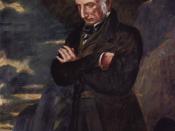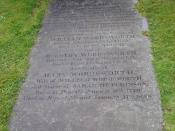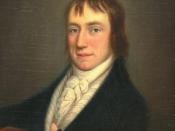Romantic poetry refers to the natural aspects of the world, focusing on the feelings of sadness and great loss or grief. Poets of the Romantic Era, such as William Wordsworth, were trying to create poetry for the common man. In Wordsworth's Preface to Lyrical Ballads, Wordsworth defines who a poet is and who he is speaking to when he says, "he is a man speaking to men." (202) This statement is accentuated in Wordworth's poetry, for he talks of commonplace, everyday things and uses a common language. William Blake is also a poet of the Romantic Era.
William Blake is described as "rebellious, unconventional, [and] fiercely idealistic." (Masters of British Literature 48) The debates centering around the Romantic Era include imagination and inspiration. William Blake has quite an imagination shown through his drawings, which accompany some of his works. There were arguments about how inspiration could be obtained for an ordinary man.
Wordsworth would say that inspiration cannot come to everyone while Blake would argue the opposite.
Blake is Christian and this is displayed through his poetry in symbolism, mostly. In Blake's poems "The Lamb" (Blake 55) and "The Tyger" (Blake 70), he is using the lamb and tyger as symbols which allude to Jesus and the devil and other biblical figures. These lines show Blakes' views of Christianity "Dost thou know who made thee" (Blake 10) "For he calls himself a Lamb." (14) "Tyger Tyger, burning bright" (Blake 1) "Did he who made the Lamb make thee?" (20) Coleman O. Parsons further discusses "the animals of philosophic speculation and of religion in relation to ['The Tyger']" (574). Blake claimed to experience visions throughout his life. They were often associated with beautiful religious themes and imagery and, therefore, may have inspired him further with spiritual works and pursuits.


